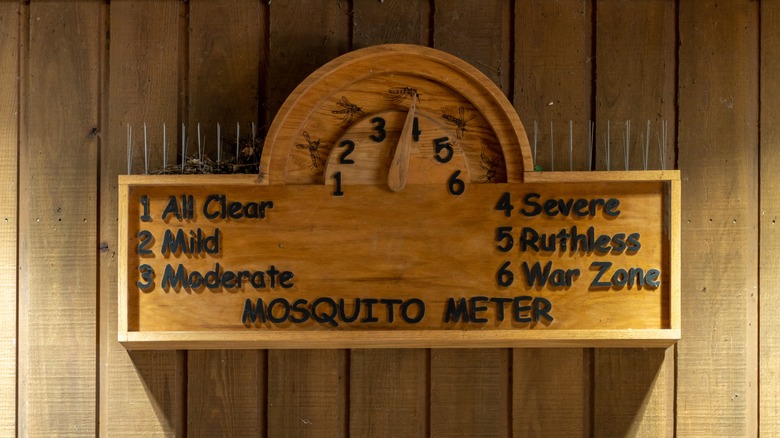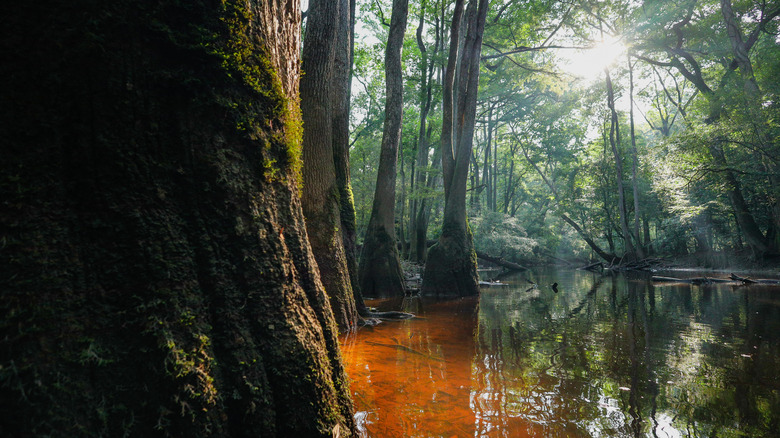The Skin-Crawling Meter Guests Are Greeted With Upon Entering Congaree National Park
Welcome signs, historical information plaques, and general notices are some signages you expect when you enter a national or state park. What you won't predict is one signpost when you visit Congaree National Park: a mosquito meter. That's right — the mosquitos are so bad at Congaree that there is a sign to warn visitors. Shaped like a clock, it uses numbers one through six to update on the whereabouts of these blood-sucking insects, ranging from "all clear" to the terrifying "war zone."
Located in South Carolina, just 30 minutes from Columbia, Congaree National Park offers a ton of outdoor activities, from wildlife viewing to water adventures and camping. But these experiences can be quickly ruined when you're fighting for your life, trying not to get bitten by mosquitos. Imagine constantly slapping your skin as you try to hike. Or worse, getting eaten alive by mosquitos in your tent when camping — you won't be able to relax or enjoy the scenery (and trust us, you want to relish in the unique beauty of this park).
So, is there anything you can do about the mosquitos beyond hoping for the best? Of course! Let's go through how to survive the "war zone" and what kinds of activities Congaree has to offer.
Strategies to beat the mosquitos at Congaree
The reason Congaree National Park is a haven for mosquitos is because it's a forested wetland. The stagnate, swamp-like water is a perfect breeding ground for mosquitos, and they take advantage of it. The first thing you can do to avoid the horror is to time your trip. If you're nearby and looking for a day trip, you can call the visitor center and see what the mosquito meter is for that day. If you're planning in advance, the worst time to go is late spring and the summer months. In contrast, early spring or late fall helps you avoid the wet season while still offering beautiful weather (maybe even better conditions since it won't be as hot).
Outside of timing, we have recommendations to help you avoid mosquitos, whether you're camping or hiking. You can camp in peace with these tips for preventing mosquito bites, such as picking a campsite away from the water and avoiding scented products. You can also keep mosquitos away on a hike with natural essential oils or the hard stuff: DEET bug spray. Additionally, try to wear long-sleeved shirts and long pants to cover as much of your skin as possible. If you're worried about getting too hot, keep the fabrics breathable and the colors bright. Of course, you can just skip Congaree altogether and focus your travels on vacation destinations where pesky mosquitos will not be your problem.
Things you can do at Congaree
If the mosquitos haven't completely turned you off, Congaree National Park is an amazing place to visit. In keeping with the bug theme, Congaree hosts a two-week synchronous fireflies event in May and June. This is a rare event where you won't be able to use DEET bug spray, as it can repel the fireflies. (Don't worry: You can put on bug spray before entering the park.)
Naturally, Congaree offers everything you'd expect from a national park. The Boardwalk Loop Trail is a 2.6-mile easy trail and one of the most popular – you can pick up a brochure to spot all the different tree species along the way. These hiking trails take you through the wetlands, giving off a creepy but beautiful horror-movie vibe. Just note that since the park is a wetland, some trails are prone to flooding. For wildlife lovers, the Weston Lake Trail is perfect for bird watching and seeing otters, while the Oakridge Trail is great for spotting deer and wild turkeys.
You can go camping (with a reservation) or head out on the water in a canoe or kayak. Congaree also offers hikes, guided walks, and paddle adventures via ranger-led tours, where you'll learn about the area from a passionate expert. For kids, Congaree offers a junior ranger program that comes with an activity booklet from the visitor center. All in all, Congaree National Park is fantastic — if you can handle the mosquitos, of course.


